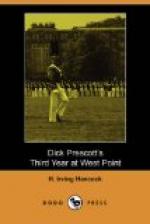One of the last of these to come was Cadet Haynes.
Greg received him rather frigidly, though with no open breach of courtesy.
“It’s too bad,” began Haynes.
“Of course it is,” nodded Holmes.
“Prescott has very little chance of remaining in the corps, I suppose?”
“The surgeons don’t quite say that,” rejoined Greg.
“Oh, the rainmakers (doctors) are always cagey about giving real information until a man’s dead,” declared the turnback sagely.
“They seem to believe that Prescott has an excellent chance,” insisted Greg.
“No bones broken?”
“Not a one.”
“What is the trouble, then?”
“The rainmakers can’t say exactly. They’re waiting and watching.”
“Humph! That sounds pretty bad for their patient.”
“They say that if Prescott is able to walk soon, then his return to duty ought to be rather speedy.”
“I’d like to believe the rainmakers,” grunted Haynes.
“Would you?” inquired Greg very coolly.
“Of course.”
“What is your particular interest in my roommate?” demanded Cadet Holmes.
He looked straight into the other’s eyes. “Why, Prescott is one of the best and most popular fellows in the class. I’ve always liked him immensely, and-----”
“Humph!” broke in Cadet Holmes, using the turnback’s own favorite word.
To just what this scene might have led it is impossible to say, but just at that instant Anstey and two other second classmen came into the room, and the turnback seized the opportunity to get away.
Though Cadet Prescott was so cheerful over his injury he was in a good deal of pain as the evening wore on.
Every hour or so Goodwin or the other surgeon came in to see him.
Though Prescott could hardly be expected to understand it, the surgeons were pleased, on the whole, with the pain. Had there been numbness, instead, the surgeons would have looked for paralysis.
Later in the night Dick asked Captain Goodwin if he could not administer some light opiate.
“You are willing to be a soldier, I know, Mr. Prescott,” replied the surgeon.
“Be sure of that, sir,” replied the young man, Wincing.
“Then try to bear the pain. It is the best indication with which we have to deal. It is one of the most hopeful symptoms for which we could look. Besides, your descriptions of the pain, and of its locality, if you are accurate, will give us our best indication of what to do for you.”
“Then I don’t want any opiate, sir,” replied Dick bluntly. “I don’t care whether I’m kept here a day or a year, or what I have to suffer, only as long as I don’t have to lose an active career in the service!”
“Good for you, my young soldier,” beamed the surgeon, patting the cadet’s hand. “The superintendent telephoned over, a little while ago, to ask how you were. I told him that your grit was the best we had seen here in a long time.”




